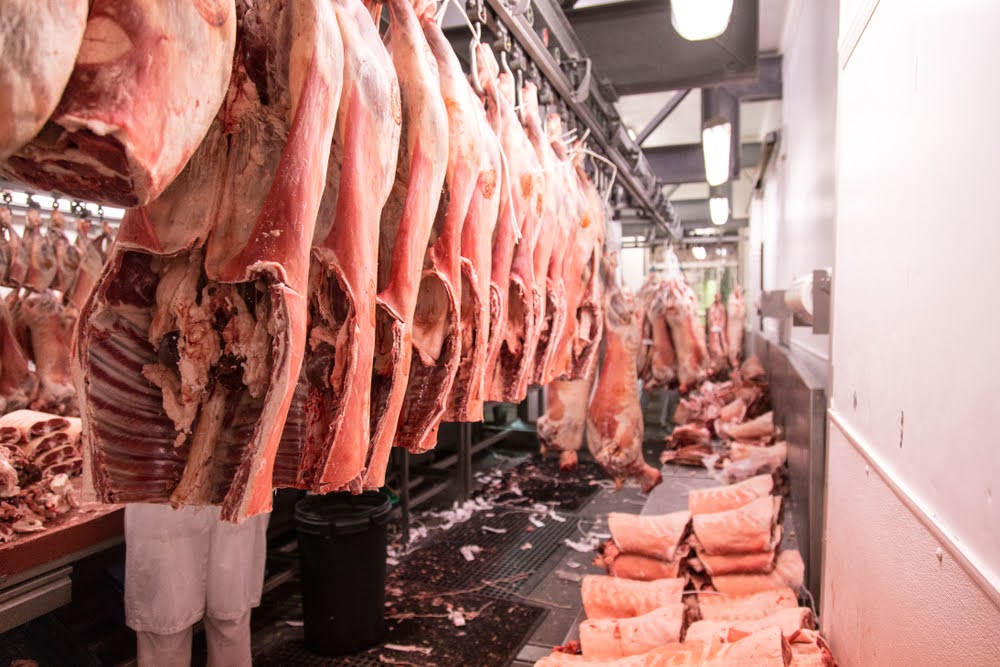In the intricate tapestry of global economics and local food production, few stories are as compelling as that of Smithfield Foods. As America’s largest pork producer, Smithfield stands at the crossroads of agricultural tradition and international business dynamics.
The company’s acquisition by a Chinese meat processing company marked a significant turning point, not only altering the trajectory of Smithfield itself but also sparking a wider conversation about the implications of foreign ownership in the U.S. agricultural sector. Here, we delve into the complex layers of Smithfield Foods, examining how its status as a leader in the pork industry intersects with its Chinese ownership to influence everything from local farming practices to global trade policies.
Smithfield Foods’ Acquisition and Global Expansion
In 2013, Smithfield Foods became a part of WH Foods, a leading Chinese meat processing company, marking a significant moment in the history of the U.S. food industry. This acquisition, valued at approximately $22 billion, was not just a financial transaction but a strategic move by WH Foods to cement its presence on the global stage and secure a reliable source of pork.
The deal was primarily motivated by the need to meet the growing pork demand in China, exacerbated by challenges such as African swine fever and a shrinking domestic pig population. By integrating Smithfield into its operations, WH Foods gained direct access to the American market’s vast agricultural resources and advanced meat processing capabilities.
Post-acquisition, Smithfield Foods expanded its export volumes, particularly to meet the demands of the Chinese market. Although exact figures are often undisclosed, reports suggest that millions of pounds of pork were shipped to China in the years following the merger, highlighting the scale of its global supply chain role. This move has not only ensured a steady pork supply for WH Foods but also positioned Smithfield as a key player in international meat trade, affecting global market dynamics and trade flows.
This strategic expansion has brought about mixed reactions in the United States, ranging from economic optimism about job creation and market growth to concerns over foreign control of American agricultural interests. As Smithfield continues to operate under the umbrella of WH Foods, the implications of this global integration are vast, influencing everything from local employment to international trade policies.

Environmental Impact of the US’s Largest Pork Producer
Smithfield Foods, recognized as the US’s largest pork producer, has faced significant scrutiny over its environmental practices, particularly in relation to its factory farming operations. The company’s extensive use of confined animal feeding operations (CAFOs) has raised concerns about the sustainable management of waste and the broader ecological impacts.
In one notable instance, aerial footage captured a vast waste lagoon at one of Smithfield’s largest facilities—a stark visual that highlighted the scale of waste produced by intensive pig farming. This lagoon, filled with pig urine and feces, is a byproduct of housing thousands of pigs under one roof, leading to challenges in waste management and disposal.
The environmental issues extend beyond waste management. The method of waste disposal—spraying it into the air—has not only affected the immediate environment but also the health of nearby communities. This practice can lead to the contamination of water sources and soil, contributing to a larger ecological footprint that goes against the principles of sustainable farming.
Furthermore, the airborne pollutants are a source of concern for public health, potentially affecting air quality and exposing local populations to harmful chemicals. These practices have occasionally led to legal challenges for Smithfield, including a significant penalty in 1997 when the company was fined $12.6 million for violating the Clean Water Act due to pollutants discharged into the Pagan River in Virginia.
Despite these challenges, Smithfield Foods claims to adhere to environmental regulations and continuously seeks to improve its practices through technology and management strategies aimed at reducing its environmental impact. However, the tension between maintaining high production levels and minimizing ecological damage remains a central issue. This situation calls for a deeper examination of the balance between industrial-scale production and environmental sustainability, especially as Smithfield Foods operates under the scrutiny that comes with being the largest pork producer in the US.
Social Implications of Factory Farming Practices
The social consequences of Smithfield Foods’ factory farming operations extend far beyond its role as the US’s largest pork producer. The communities living in proximity to Smithfield’s vast farming facilities bear the brunt of the environmental fallout, facing daily challenges that stem from being near such large-scale operations. One of the most pressing issues is the impact on local air quality, which is significantly affected by the particulate matter and odors emitted from the waste sprayed into the air. These airborne contaminants contribute to respiratory problems, exacerbating health conditions like asthma and potentially leading to long-term pulmonary diseases.
Dr. Steve Wing from the University of North Carolina has highlighted that the particulate matter can drift into neighboring communities, worsening the air quality and leading to an increase in respiratory symptoms among residents. The situation is particularly dire for low-income families who often have limited resources to address these health risks or relocate to healthier environments.
This ongoing exposure raises significant concerns about environmental justice, as these communities are disproportionately affected by decisions made by large corporations like Smithfield, often without adequate compensation or mitigation measures in place.
Moreover, the social fabric of these communities is tested as they grapple with the stench and pollution that invade their homes, forcing residents to keep windows closed and limiting their outdoor activities. This not only affects their physical health but also their mental well-being and community cohesion. The struggle against such a powerful entity as Smithfield Foods underscores a broader issue of social inequality and highlights the need for stronger community engagement and corporate responsibility practices that prioritize human and environmental health over profit.

The Need for Regulatory Oversight and Consumer Awareness
As Smithfield Foods continues to dominate as the US’s largest pork producer under foreign ownership, the necessity for increased regulatory oversight and heightened consumer awareness becomes ever more apparent.
The environmental and social impacts of Smithfield’s operations underscore the importance of stringent environmental policies and proactive community health measures to safeguard both the ecosystem and the public. Regulatory bodies like the Environmental Protection Agency (EPA) play a critical role in ensuring that practices at large agricultural enterprises such as Smithfield adhere to national standards designed to protect water quality, air quality, and overall environmental health.
Consumer awareness is equally crucial in this dynamic. Today’s consumers are more informed and concerned about where their food comes from and its impact on the environment and society. This shift in consumer behavior can drive change at the corporate level, as companies are compelled to adopt more sustainable and ethical practices to maintain their market position and public image. By opting for products that are sustainably sourced and ethically produced, consumers wield significant power to influence corporate behaviors and industry standards.
Moreover, the narrative surrounding Smithfield Foods serves as a vital reminder of the need for transparency in the food industry. Consumers have the right to understand the origins of their food and the conditions under which it was produced. This transparency not only helps in making informed choices but also fosters a more accountable and ethical food industry. As we move forward, it is crucial for policymakers, companies, and consumers to collaborate in fostering an industry that prioritizes sustainability, ethics, and health over mere profitability.
My Personal RX on Wiser Shopping and Food Vigilance
In the context of understanding the impact of corporate ownership on food quality and safety, it’s important to adopt wiser shopping habits, particularly when it comes to large food producers like Smithfield Foods.
As a doctor, I advise my patients to be vigilant about what ends up on their tables, especially given concerns that may arise from changes in ownership, such as differing standards or practices. Making informed decisions about the food we consume is not just about personal health; it’s also about supporting practices that align with sustainable and ethical standards.
- Research Company Practices: Before purchasing products, take some time to research the company’s ownership and their production practices. Companies like Smithfield Foods, under Chinese ownership, may operate under different standards which can impact the quality of the food.
- Read Labels Carefully: Always read labels for any product you consider buying. Look for certifications that indicate quality and ethical standards, such as “organic,” “free-range,” or “non-GMO.”
- Support Local Producers: Whenever possible, buy from local farms and producers. Local products are often fresher and it’s easier to verify their production practices directly.
- Stay Hydrated: Drinking enough water is crucial for maintaining the health of your gut lining, which plays a significant role in protecting your body from pathogens.
- Increase Your Vitamin C Intake: Oranges, strawberries, bell peppers, and broccoli are great sources of Vitamin C, which can help boost your immune system.
- Add a Targeted Nutrient Blend: Consider incorporating a supplement like Immune Support, which is a targeted blend of nutrients designed to bolster your body’s immune reserves.
- Limit Processed Foods: Reducing the intake of highly processed foods can decrease inflammation and promote better immune response.
- Follow My Protocol Guide : Engage with comprehensive guides like my Protocol Guide, which offers powerful insights into living your best life by focusing on holistic health strategies.
- Educate Yourself on Industry Impacts: Understand the broader impacts of purchasing decisions, including environmental, ethical, and social factors. This broader perspective can influence more sustainable and health-conscious choices.
- Stay Updated on Food News: Keep informed about news related to food safety, recalls, and regulatory changes. This knowledge can help you make better choices and avoid products that might be compromised.
Sources:
- Smithfield Foods. (n.d.). https://www.smithfieldfoods.com/
- Hult, J. (2024, April 7). EPA data: South Dakota industrial chemical releases rise amid national decline. South Dakota Searchlight. https://southdakotasearchlight.com/2024/04/07/epa-data-south-dakota-industrial-chemical-releases-rise-amid-national-decline/
- Environmental health: Concentrated Animal feeding Operations (CAFOs). (2023, February 6). Wisconsin Department of Health Services. https://www.dhs.wisconsin.gov/environmental/cafo.htm
- What is Sustainable Agriculture? (2017, April 10). Union of Concerned Scientists. https://www.ucsusa.org/resources/what-sustainable-agriculture




















